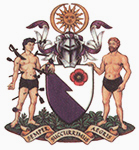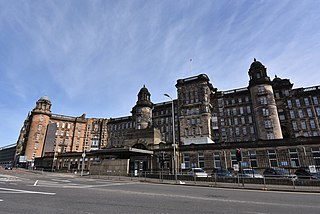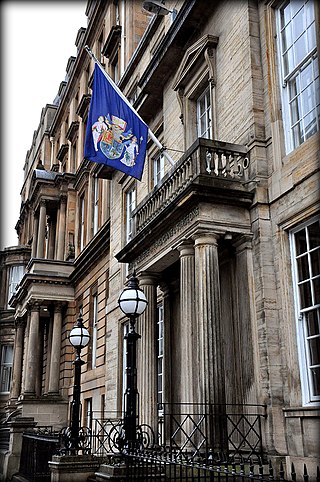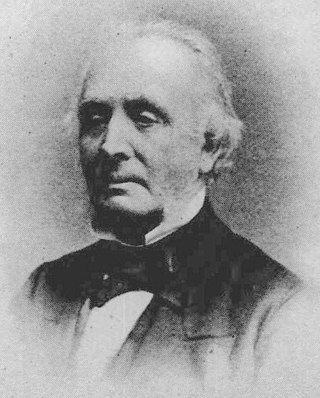Related Research Articles

General surgery is a surgical specialty that focuses on alimentary canal and abdominal contents including the esophagus, stomach, small intestine, large intestine, liver, pancreas, gallbladder, appendix and bile ducts, and often the thyroid gland. They also deal with diseases involving the skin, breast, soft tissue, trauma, peripheral artery disease and hernias and perform endoscopic as such as gastroscopy, colonoscopy and laparoscopic procedures.

The Royal College of Surgeons of England is an independent professional body and registered charity that promotes and advances standards of surgical care for patients, and regulates surgery and dentistry in England and Wales. The college is located at Lincoln's Inn Fields in London. It publishes multiple medical journals including the Annals of the Royal College of Surgeons of England, the Faculty Dental Journal, and the Bulletin of the Royal College of Surgeons of England.

The Medical Research Council (MRC) is responsible for co-coordinating and funding medical research in the United Kingdom. It is part of United Kingdom Research and Innovation (UKRI), which came into operation 1 April 2018, and brings together the UK's seven research councils, Innovate UK and Research England. UK Research and Innovation is answerable to, although politically independent from, the Department for Business, Energy and Industrial Strategy.
Membership of the Royal Colleges of Physicians of the United Kingdom (MRCP(UK)) is a postgraduate medical diploma in the United Kingdom (UK). The examinations are run by the Federation of the Medical Royal Colleges – the Royal College of Physicians of London, the Royal College of Physicians of Edinburgh, and the Royal College of Physicians and Surgeons of Glasgow. The three Royal Colleges of Physicians share this common three part assessment in general medicine which consists of two written parts and one clinical examination. Examinations are held throughout the UK and in overseas centres.
Fellowship of the Royal Colleges of Surgeons (FRCS) is a professional qualification to practise as a senior surgeon in Ireland or the United Kingdom. It is bestowed on an intercollegiate basis by the four Royal Colleges of Surgeons. The initials may be used as post-nominal letters.
The Royal College of Surgeons is an ancient college established in England to regulate the activity of surgeons. Derivative organisations survive in many present and former members of the Commonwealth. These organisations are now also responsible for training surgeons and setting their examinations.

The Royal College of Surgeons of Edinburgh (RCSEd) is a professional organisation of surgeons. The College has six active faculties, covering a broad spectrum of surgical, dental, and other medical practices. Its main campus is located on Nicolson Street, Edinburgh, within the Surgeons' Hall, designed by William Henry Playfair, and adjoining buildings. The main campus includes a skills laboratory, the Surgeons' Hall Museums, a medical and surgical library, and a hotel. A second office was opened in Birmingham (UK) in 2014 and an international office opened in Kuala Lumpur, Malaysia, in 2018.

The Royal College of Emergency Medicine (RCEM) is an independent professional association of emergency physicians in the United Kingdom which sets standards of training and administers examinations for emergency medicine. The patron is The Princess Royal.

The Glasgow Royal Infirmary (GRI) is a large teaching hospital. With a capacity of around 1,000 beds, the hospital campus covers an area of around 8 hectares, and straddles the Townhead and Dennistoun districts on the north-eastern fringe of the city centre of Glasgow, Scotland. It is managed by NHS Greater Glasgow and Clyde. It was originally opened in 1794, with the present main building dating from 1914.

The Royal College of Physicians and Surgeons of Glasgow is an institute of physicians and surgeons in Glasgow, Scotland.

Thomas Michael Greenhow MD MRCS FRCS was an English surgeon and epidemiologist.
The Faculty of Dental Surgery of the Royal College of Surgeons of England is an independent UK professional body committed to enabling dental specialists to provide patients with the highest possible standards of practice and care. The faculty is an integral part of the Royal College of Surgeons of England and is located at the College's headquarters in Lincoln's Inn Fields in London.
In the United Kingdom, some Commonwealth realms and Ireland, a medical royal college is a professional body in the form of a royal college responsible for the development of and training in one or more medical specialities.
The University of Edinburgh Medical School is the medical school of the University of Edinburgh in Scotland and the United Kingdom and part of the College of Medicine and Veterinary Medicine. It was established in 1726, during the Scottish Enlightenment, making it the oldest medical school in the United Kingdom and the oldest medical school in the English-speaking world.

Charles Frederick William Illingworth was a British surgeon who specialised in gastroenterology. Along with a range of teaching and research interests, he wrote several surgical textbooks, and played a leading role in university and medical administration.
Care of the Critically Ill Surgical Patient (CCrISP) is a training programme for surgical doctors. The course covers the theoretical basis and practical skills required to manage critically ill surgical patients. It is managed by the Royal College of Surgeons of England. The 4th edition, which reduced the duration to 2 days, was released in February 2017.
Professor Charles Samuel Bernard Galasko ChM, FRCS, FRCSEd, FCMSA (Hon), FFSEM (Ire), FFSEM (UK), FMedSci, often cited as Charles S. B. Galasko, is a South African orthopaedic surgeon.

John Ivor Pulsford James was a British orthopaedic surgeon. He was professor of orthopaedic surgery at the University of Edinburgh from 1958 to 1979. Most commonly known as "JIP", he was secretary then president of the British Orthopaedic Association which later awarded him its honorary fellowship. James attracted orthopaedic specialists to work in Edinburgh, encouraging them to develop an interest in a specialist area of orthopaedics, and in this way he was able to establish a comprehensive regional orthopaedic service. He made contributions to hand surgery and surgical treatment of scoliosis, and was a prime mover in promoting specialist training and qualification in orthopaedic surgery in the UK.

Ruth Nicholson FRCOG was an English obstetrician and gynaecologist who served as a surgeon in the Scottish Women's Hospital at Royaumont, France during the First World War. For this work she was awarded the Croix de Guerre and the Médaille d’Honneur des Épidémies by the French government. After the war she specialised in obstetrics and gynaecology as Clinical Lecturer and Gynaecological Surgeon at the University of Liverpool with consultant appointments at Liverpool hospitals. She was a founder member of the Royal College of Obstetricians and Gynaecologists in 1929, being elevated to fellow of the college in 1931.
References
- ↑ "Welcome to MRCS From September 2008". www.intercollegiatemrcsexams.org.uk. Retrieved 17 January 2015.
- ↑ "Newcastle Medical Journal: The Journal of the Newcastle Upon Tyne and Northern Counties Medical Society, Volume 25". 1956 - Newcastle-upon-Tyne and Northern Counties Medical Society. 1956. Retrieved 12 March 2017.
Thomas Michael Greenhow (1792-1881) (Fig. 4) was born on 5th July, 1792, the son of Edward M. ... He was educated at Edinburgh University and became M.R.C.S. (London) in 1814. He entered the army as an assistant surgeon....
- 1 2 Brennan, PA; Sherman, KP (December 2014). "The MRCS examination--an update on the latest facts and figures". British Journal of Oral and Maxillofacial Surgery. 52 (10): 881–3. doi:10.1016/j.bjoms.2014.08.011. PMID 25218314.